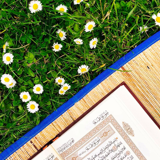One concern that often crops up in the lives of those who want to achieve but cannot because of an inability to translate their desires and motivation into action is, how does one get out of this rut?
A sister recently, may Allāh bless her, penned it so eloquently. I saw myself in her words, as I’m sure many others do so as well.
She wrote about her desire to commit the Qurʾān to memory. She has the intelligence, she knows of the virtues, she is aware of the enormity of the rewards that follow; she wants it earnestly. But despite this combination that one would assume will ensure success, she is unable to master herself to produce consistent actions that lead her to the goal.
How many of us find ourselves in such a situation? Thoroughly aware of a certain good that we can achieve and possibly are able to do so, and WANT to do so. Yet each time, we fail to commit to the daily action that is necessary for attainment. We while away hours in deplorable habits (staring at screens, not reading nor watching that which is beneficial, simply staring with eyes glazed.) The 5 minutes of checking our phones turn into hours; a simple check of your phone usage will confirm this.
I have been thinking about this a lot recently. There is a two-fold ‘solution’ that comes to mind. It is not a simple solution, nor is it one that can be implemented overnight.
See, the hurdle described here is one every single human being faces. This is where جهاد النفس comes in. You have to wage a war against your own self to make it comply to you and to stop yourself from giving into every one of its demands. Your nafs wants ease and relaxation. It wants to bask in pleasures; it wants immediate pleasures. Ḥifḏh, as an example, goes against the nature of this nafs—Ḥifḏh is sheer hard work. Given the two contrasting matters, of course your nafs will fight it and it will not enjoy it.
You will only succeed when you tame that nafs.
This is something that even the salaf struggled with. There is report of a tabiʿī who says that he fought his nafs to pray qiyam Al-layl for TWENTY years and then after that his nafs started to comply readily. For those 20 years, he had to wage a war against his nafs to make it comply.
Moḥammed b. Al-Munkadir said, “I toiled my nafs for 40 years, after which it complied.”
Another scholar of the earlier generation said in an introduction to his book that he struggled to find joy in ṭalab Al-ʿilm in his youth but he persisted until he found that enjoyment at an older age. That period of forcing oneself to do that which we dislike is necessary to reap the fruits.
This issue is not yours or mine alone. This is a human issue.
Some months ago I met a lady around my mother’s age at the masjid. She had memorised the Qurʾān at a younger age and overtime her memory of it weakened (because of lack of revision), she took my hands in hers and begged for a way to help her remember it again. As I was explaining the right approach for someone in her situation, she abruptly says, “Do you know what I need? I need a beating with a stick.” It made me laugh then but this is exactly what we all need, figuratively, of course.
THIS is the solution. If we find ourselves weaken, we need to give ourselves that stick.
We are too easy on ourselves when it comes to ṭalab al-ʿilm and memorisation of the Qurʾān.
Tell yourself that you will not eat breakfast or lunch or dinner until you complete your Ḥifḏh portion for the day and stick to that threat. Your nafs needs to understand that you mean business. If you weaken then the next day it will want that ease again.
The author Cal Newport who writes on productivity, addresses something relevant to this discussion of ours. He addresses the problem of social media that has plagued this generation. He explains that in order to get solid work done, you have to put social media under lock and key and there is absolutely no exception. The minute you make an exception your brain learns that this line of prohibition is permeable. You can cross it at will. Because of this, it will not comply. Every time you sit down to do work, you will be tempted to go on social media and waste time, and that is exactly what you will do. To avoid this, the brain (as the author says, or the nafs in our case) needs to understand the lines that you have drawn cannot be crossed.
This is why if you plan to memorise some āyāt every day and you have not completed that portion by evening, you do not go to sleep until you have done it. Your nafs needs to understand that you are not one to be messed with. The next day your nafs will comply a bit more for fear that you might stay up at night again to finish your portion.
The famous scholar Al-Fayrūzabādī said about how he memorised the Qurʾān and other religious texts, “I would not sleep until I had memorised 200 lines.”
We use these tactics on children; you do not do your homework so you do not get your favourite treat. You did not comply with my instructions so you will miss the trip to the park that you really wanted. But when it comes to our own selves, we give our nafs everything that it so desires without restrictions and without consequences.
The key is to set a goal and—rain or shine—stick to it.
The above comes second to duʿāʾ and begging Allāh for help and assistance.
Recently my Qurʾān teacher reminded me that recitation and memorisation of the Qurʾān is not down to intelligence and skill, it is simply a favour of Allāh. To be given that favour, one needs to prove to Allāh that they are worthy of it and are desperate for it.
May Allāh make us worthy to bear the Qurʾān.
Subscribe for Updates
Original content used with permission from:






